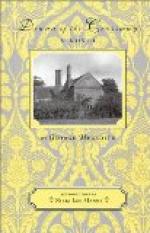There lay on his table at night a letter; a bulky letter. No need to tear it open for sight of the signature: the superscription was redolent of that betraying woman. He tossed it unopened into the fire.
As it was thick, it burned sullenly, discolouring his name on the address, as she had done, and still offering him a last chance of viewing the contents. She fought on the consuming fire to have her exculpation heard.
But was she not a shameless traitor? She had caught him by his love of his country and hope to serve it. She had wound into his heart to bleed him of all he knew and sell the secrets for money. A wonderful sort of eloquence lay there, on those coals, no doubt. He felt a slight movement of curiosity to glance at two or three random sentences: very slight. And why read them now? They were valueless to him, mere outcries. He judged her by the brute facts. She and her slowly-consuming letter were of a common blackness. Moreover, to read them when he was plighted to another woman would be senseless. In the discovery of her baseness, she had made a poor figure. Doubtless during the afternoon she had trimmed her intuitive Belial art of making ‘the worse appear the better cause’: queer to peruse, and instructive in an unprofitable department of knowledge-the tricks of the sex.
He said to himself, with little intuition of the popular taste: She wouldn’t be a bad heroine of Romance! He said it derisively of the Romantic. But the right worshipful heroine of Romance was the front-face female picture he had won for his walls. Poor Diana was the flecked heroine of Reality: not always the same; not impeccable; not an ignorant-innocent, nor a guileless: good under good leading; devoted to the death in a grave crisis; often wrestling with her terrestrial nature nobly; and a growing soul; but not one whose purity was carved in marble for the assurance to an Englishman that his possession of the changeless thing defies time and his fellows, is the pillar of his home and universally enviable. Your fair one of Romance cannot suffer a mishap without a plotting villain, perchance many of them; to wreak the dread iniquity: she cannot move without him; she is the marble block, and if she is to have a feature, he is the sculptor; she depends on him for life, and her human history at least is married to him far more than to the rescuing lover. No wonder, then, that men should find her thrice cherishable featureless, or with the most moderate possible indication of a countenance. Thousands of the excellent simple creatures do; and every reader of her tale. On the contrary, the heroine of Reality is that woman whom you have met or heard of once in your course of years, and very probably despised for bearing in her composition the motive principle; at best, you say, a singular mixture of good and bad; anything but the feminine ideal of man. Feature to some excess, you think, distinguishes her. Yet she furnishes not any of the sweet sensual excitement pertaining to her spotless rival pursued by villany. She knocks at the doors of the mind, and the mind must open to be interested in her. Mind and heart must be wide open to excuse her sheer descent from the pure ideal of man.




